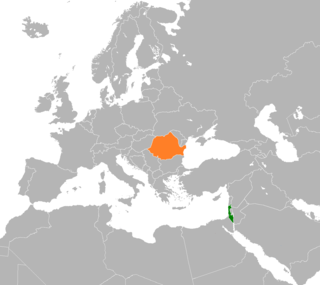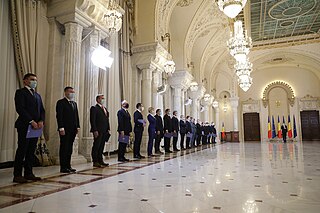Ciolacu Cabinet may refer to:
- First Ciolacu cabinet, 2023-2024
- Second Ciolacu Cabinet, 2024 (incumbent)
Ciolacu Cabinet may refer to:

The prime minister of Japan is the head of government of Japan. The prime minister chairs the Cabinet of Japan and has the ability to select and dismiss its ministers of state. The prime minister also serves as the commander-in-chief of the Japan Self Defence Forces and is a sitting member of either house of the National Diet.

The prime minister of Romania, officially the prime minister of the Government of Romania, is the head of the Government of Romania. Initially, the office was styled President of the Council of Ministers, when the term "Government" included more than the Cabinet, and the Cabinet was called the Council of Ministers. The title was officially changed to Prime Minister by the 1965 Constitution of Romania during the communist regime.

The Social Democratic Party is the largest political party in Romania. It is also the largest social democratic political party in the country. It was founded by Ion Iliescu, Romania's first democratically elected president at the 1990 Romanian general election. It is currently part of the National Coalition for Romania (CNR), which is a big tent grand coalition comprising also the National Liberal Party (PNL). The CNR formerly included the Democratic Alliance of Hungarians in Romania (UDMR/RMDSZ) until mid June 2023.
Ioana or Oana is a female given name of Romanian origin. It is the equivalent of the English name Joan, and the male version John, all of which derive from the Hebrew name Yohanan. A common diminutive is Ionela.

Israel–Romania relations are foreign relations between Israel and Romania. The two nations established diplomatic relations on 11 June 1948. Israel has an embassy in Bucharest. Romania has an embassy in Tel Aviv and a general consulate in Haifa, and 2 honorary consulates. The two have signed treaties and agreements and both are full members of the Union for the Mediterranean.
Făgădău may refer to several places in Moldova:

Ion-Marcel Ciolacu is a Romanian politician who currently serves as the prime minister of Romania. He is the leader of the Social Democratic Party (PSD) since 2019. As a previously little-known politician outside of Buzău County, where he owns a pastry shop and a consulting firm, Ciolacu came into national prominence when he became the deputy prime minister in 2018 in the cabinet of Prime Minister Mihai Tudose.
A rotation government or alternation government is one of the ways of forming of a government in a parliamentary state. It is a government that, during its term, will see the individual holding the post of prime minister switch, whether within the same political bloc or as part of a grand coalition. Israel has seen by far the most experience with such a governing arrangement. The government of Ireland is now in its second rotation agreement. Usually, this alternation is guided by constitutional convention with tactical resignation of the first officeholder to allow the second to form a new government. Israel, which established the rotation mechanism in 1984, codified it in 2020.

Nicolae Ionel Ciucă is a Romanian politician and retired general of the Romanian Land Forces who is serving as the president of the Senate of Romania. Ideologically a conservative, he served as Prime Minister of Romania between 25 November 2021 and 12 June 2023 after receiving widespread parliamentary support on behalf of his own party, the National Liberal Party (PNL) along with the Social Democratic Party (PSD) and the Democratic Alliance of Hungarians in Romania (UDMR/RMDSZ). Since 10 April 2022, he has also been serving as the president of the National Liberal Party (PNL). On 12 June 2023, he resigned as prime minister, as part of a deal with his coalition partner, the PSD, to switch places with Marcel Ciolacu, and was temporarily replaced by Cătălin Predoiu.

The Cîțu Cabinet was the 131st government of Romania, led by the national liberal (PNL) Prime Minister Florin Cîțu. It was removed from office after a motion of no confidence passed by the Parliament with a record of 281 votes, the largest number of votes on a motion of no confidence since the Romanian Revolution.

Lucian Bode is a Romanian politician who served as Minister of Internal Affairs in the Cîțu Cabinet from 2020 to 2023. He previously served as Minister for Transport, Information and Communications in the first cabinet and second cabinet led by Ludovic Orban. He is affiliated with the National Liberal Party (PNL).

Parliamentary elections were held in Romania on 1 December 2024. No party won a majority in the election, which saw the incumbent National Coalition for Romania, led by the Social Democratic Party and the National Liberal Party (PNL), lose their majority in both chambers of parliament alongside significant gains by far-right parties such as the Alliance for the Union of Romanians (AUR), S.O.S. Romania, and the Party of Young People (POT). Following the elections, a pro-European grand coalition government was formed between the PSD, the PNL, and the UDMR, with the support of the national minorities. On 23 December, Ciolacu’s second cabinet was inaugurated by a slim margin, with 240 votes out of 465 in favour.
Ciolacu is a Romanian surname. Notable people with the surname include:
A political crisis began on 1 September 2021 in Romania, engulfing both major coalition partners of the Cîțu Cabinet, namely the conservative-liberal National Liberal Party (PNL) and the progressive-liberal Save Romania Union (USR). The crisis also involved former prime minister Ludovic Orban (PNL), who was set to face Prime Minister Florin Cîțu (PNL) in a leadership election during the party congress on 25 September, with the latter eventually replacing the former. Orban would eventually resign from his position as President of the Chamber of Deputies, with him and his supporters subsequently splitting from the PNL, in order to form the Force of the Right (FD).

The Ciucă Cabinet was the 132nd government of Romania led by former Romanian Land Forces army general Nicolae Ciucă from 25 November 2021 to 12 June 2023.

The National Coalition for Romania, initially referred to as the Coalition for Resilience, Development and Prosperity, is a big tent grand coalition in Romania, which includes the Social Democratic Party (PSD) and the National Liberal Party (PNL). In addition, this grand coalition supports the presidency of Klaus Iohannis. The CNR also included the Democratic Alliance of Hungarians in Romania (UDMR/RMDSZ) until its withdrawal from the coalition in June 2023.
Beginning at 04:05 EEST on 29 April 2022, a series of multiple denial-of-service attack (DDoS) attacks were launched against several Romanian government, military, bank and mass media websites. Behind the attacks was the pro-Kremlin hacking group Killnet, who resorted to this in response to a declaration made by Florin Cîțu, the then-president of the senate of Romania, that Romania would provide Ukraine with military aid. The Russian Federation, who invaded the latter, publicly spoke against Western military support for Ukraine, stating that it would result in "lightning-fast retaliatory strikes". The DDoS attacks continued until 1 May.

The First Ciolacu Cabinet was the 133rd government of Romania, from 15 June 2023 to 23 December 2024. The government was led by Marcel Ciolacu, who is also the current leader of the Social Democratic Party (PSD).

The Second Ciolacu Cabinet is the 134th government of Romania, since 23 December 2024. The government is led by Marcel Ciolacu, who is also the current leader of the Social Democratic Party (PSD).